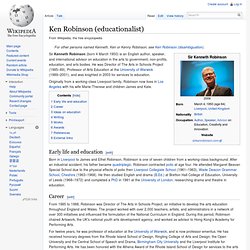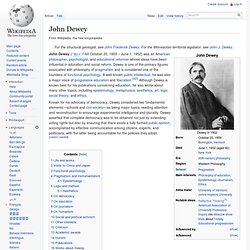

Rudolf Steiner. Maria Montessori. Maria Tecla Artemesia Montessori (Italian pronunciation: [maˈria montesˈsɔri]; August 31, 1870 – May 6, 1952) was an Italian physician and educator best known for the philosophy of education that bears her name, and her writing on scientific pedagogy.

Her educational method is in use today in public and private schools throughout the world. Life and career[edit] Birth and family[edit] Italian 1000 Lire banknote (approx. 0.52 €) representing Maria Montessori. Montessori was born on August 31, 1870 in Chiaravalle, Italy. 1883–1896: Education[edit] Early education[edit] The Montessori family moved to Florence in 1873 and then to Rome in 1875 because of her father's work. Secondary school[edit] In 1883[6] or 1884,[7] at the age of 13, Montessori entered a secondary, technical school Regia Scuola Tecnica Michelangelo Buonarroti, where she studied Italian, arithmetic, algebra, geometry, accounting, history, geography, and sciences. University of Rome—Medical school[edit] Public advocacy[edit] 9–10. CTL Events - Award-Winning Teachers on Teaching. Ken Robinson (British author) Sir Kenneth Robinson (born 4 March 1950) is an English author, speaker, and international advisor on education in the arts to government, non-profits, education, and arts bodies.

He was Director of The Arts in Schools Project (1985–89), Professor of Arts Education at the University of Warwick (1989–2001), and was knighted in 2003 for services to education. Originally from a working-class Liverpool family, Robinson now lives in Los Angeles with his wife Marie-Therese and children James and Kate. Born in Liverpool to James and Ethel Robinson, Robinson is one of seven children from a working-class background. After an industrial accident, his father became quadriplegic. Robinson contracted polio at age four. From 1985 to 1988, Robinson was Director of The Arts in Schools Project, an initiative to develop the arts education throughout England and Wales. For twelve years, he was professor of education at the University of Warwick, and is now professor emeritus. John Dewey. John Dewey (/ˈduːi/; FAA October 20, 1859 – June 1, 1952) was an American philosopher, psychologist, and educational reformer whose ideas have been influential in education and social reform.

Dewey is one of the primary figures associated with philosophy of pragmatism and is considered one of the founders of functional psychology. A well-known public intellectual, he was also a major voice of progressive education and liberalism.[2][3] Although Dewey is known best for his publications concerning education, he also wrote about many other topics, including epistemology, metaphysics, aesthetics, art, logic, social theory, and ethics.
Known for his advocacy of democracy, Dewey considered two fundamental elements—schools and civil society—as being major topics needing attention and reconstruction to encourage experimental intelligence and plurality. Life and works[edit] Along with the historians Charles A. Dewey was first married to Alice Chipman. Visits to China and Japan[edit]